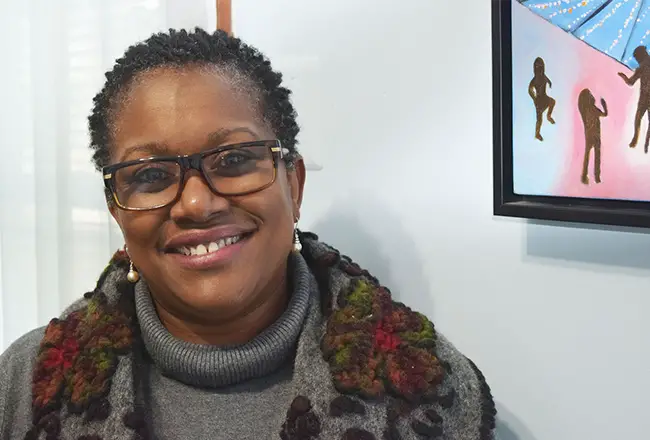Bridgeport’s Caroline House empowers immigrant women with English fluency
When walking through the hallways at Caroline House, one is met by a concerto of accented voices embracing the poetry and complexity of the English language.
But this is not a typical educational institution. Situated in a one-time Bridgeport residence dating back to 1907, the environment within Caroline House has a friendly resonance coming from the various rooms of the charming old structure.
“What makes us different is the homey effect,” explained Lucy Freeman, Caroline House”™s executive director. “We make people as comfortable as we possibly can.”

The idea for Caroline House was sparked in 1992 by the School Sisters of Notre Dame, a Roman Catholic religious institute focused on education. The Sisters opened Caroline House in November 1995 to bring educational and emotional empowerment to immigrant women and children who found themselves isolated from the wider American culture due to unfamiliarity with English.
“We try to build confidence,” continued Freeman. “Many of them are able to speak the language, but they do it in such a way that no one will hire them because they are so nervous about their English. We encourage women to speak as much as possible.”
Caroline House operates as an independent nonprofit, with only two nuns on its staff. Its scheduling is mostly in synchronization with Bridgeport”™s public school system, although sometimes new classes are added to meet demand.
“This year, we brought in a whole new set of students in January because so many people were calling to say they wanted to attend,” said Freeman, adding that a new after-school program aimed at Latina girls was beginning this month.
The student body at Caroline House is 70 adult women, and Freeman estimated 90% of those in attendance are from Latin America, with Haitian immigrants accounting for the second-largest demographic. The level of English fluency varies widely among the students.
“People come here at different stages,” Freeman observed. “Some people speak the language fairly well, but they cannot read or write. Sometimes it is the other way around. Most of our women have been here for years and have not been able to learn the English language because they are working, so we try to be as flexible as much as we can. We try to figure out what works best for each individual.”
Caroline House”™s curriculum begins with an introductory class, but Freeman noted that it can quickly become apparent which women require more attention to the basic lessons and which ones are able to move into more advanced classes. Many of the women have children, and Caroline House offers a day care class that provides educational lessons for the youngsters.
“If your child is potty-trained, you can come,” Freeman said. “We are teaching children the basics: how to get along with others, how to share, to say ”˜please”™ and ”˜thank you.”™ ”
Having mothers in the same building with their children helps alleviate both parental concerns on the quality of care and the children”™s potential anxiety of being separated from a parent. When mothers are not able to attend classes, Freeman makes arrangements to determine if there is another adult student who knows the child and would be able to take him or her home at the end of the sessions.
“We don”™t want to lose them,” Freeman added.
There is a $25 deposit for books that is refunded upon completion of the program. Students learn of the nonprofit primarily through word of mouth and from social service agency recommendations. Private and foundation philanthropic generosity helps to keep Caroline House in operation.
“I always say that I don”™t speak Spanish,” she said. “I always say the best measurement is me. If you are talking to me and I am not confused, then you are speaking English.”
As for the absence of adult male students, Freeman acknowledged there were cultural considerations among some members of the immigrant communities that still adhere to a conservative brand of patriarchy ”” thus, all-women classes are preferred to coeducational gatherings. Nonetheless, she stressed that women are the foundation for bringing their households into full assimilation with the English-speaking society around them.
“If you help the women, you help the family,” she stated.
UPDATE: In the aftermath of the state government’s edict to close schools during the ongoing COVID-19 crisis, Caroline House is continuing its educational outreach via online learning.